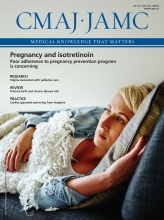Abstract
Background: Early palliative care is increasingly recommended but seldom practised. We sought to examine perceptions of palliative care among patients with advanced cancer and their caregivers.
Methods: After conducting a cluster randomized controlled trial of early palliative care versus standard care for patients with advanced cancer, we approached patients and their caregivers to participate in semistructured interviews seeking to assess, qualitatively, their attitudes and perceptions about palliative care. We used the grounded theory method for data collection and analysis.
Results: A total of 48 patients (26 intervention, 22 control) and 23 caregivers (14 intervention, 9 control) completed interviews. Participants’ initial perceptions of palliative care in both trial arms were of death, hopelessness, dependency and end-of-life comfort care for inpatients. These perceptions provoked fear and avoidance, and often originated from interactions with health care professionals. During the trial, those in the intervention arm developed a broader concept of palliative care as “ongoing care” that improved their “quality of living” but still felt that the term itself carried a stigma. Participants in the intervention group emphasized the need for palliative care to be reframed and better explained by health care professionals. Participants in the control group generally considered it pointless to rename palliative care, but many in the intervention group stated emphatically that a different name was necessary in the early outpatient setting.
Interpretation: There is a strong stigma attached to palliative care, which may persist even after positive experiences with an early palliative care intervention. Education of the public, patients and health care providers is paramount if early integration of palliative care is to be successful.
- Accepted January 18, 2016.












Podcast